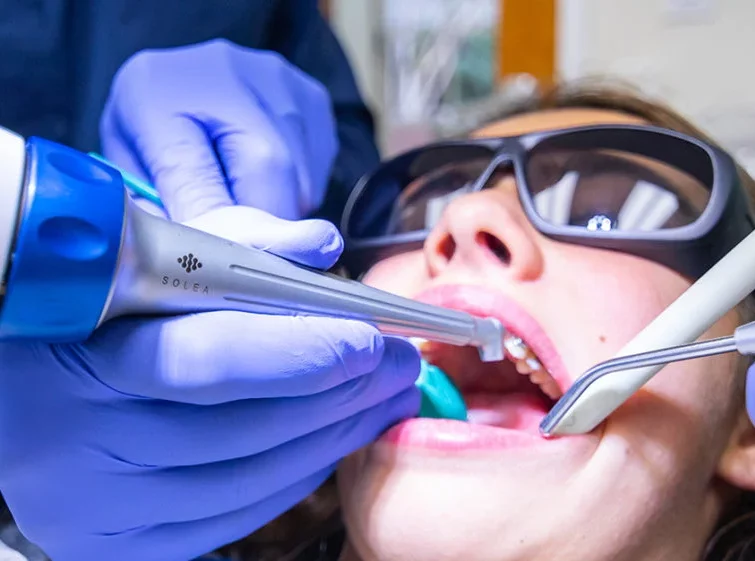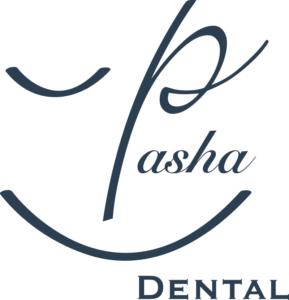Pasha Dental is the only dentist outside Manhattan that uses the Solea® dental laser. The Solea® dental laser was based off of research at the University of California School of Dentistry and further developed in Boston, Massachusetts by Convergent Dental. The Solea® laser uses a specific infrared wavelength that reacts with water, CO2, and enamel to remove hard and soft tissues by essentially vaporizing them, while also sealing off blood vessels and nerves. This equates to precise cuts that are quick, painless, and blood-free. Because of this, dental treatment with Solea® is quicker than traditional dental procedures, does not use needles or dental drills, allows for multi-quadrant dentistry, and is anxiety-free.
Did you know
Solea® dental lasers represent the dentistry of the future. Through the use of dental lasers, dental drills, lengthy procedures, and numbing injections will become a thing of the past. Solea® envisions dental care that is quick, efficient, and comfortable.
Solea® dental lasers can be used for the following dental procedures:
- Fillings
- Frenectomies
- Gingivectomies
- Crown lengthenings
- Removing tooth decay
- Removing canker sores or fibromas
- Uncovering partially erupted wisdom teeth
- Removing swollen tissues or inflamed periodontal pockets
- Release of tethered oral tissues such as tongue and lip ties
- Any procedure that requires the modification of enamel, gum, or bone
Frequently Asked Questions
Am I a candidate for treatment with a Solea® dental laser?
If your procedure requires the modification of your tooth enamel, gum, or bone, then you may be a candidate for dental treatment with a Solea® dental laser. Possible examples of such treatments include fillings, removing tooth decay or swollen tissues, or crown lengthening. To find out if your dental treatment can be completed comfortably and quickly through the use of a Solea® dental laser, schedule a consultation with Dr. Pasha today!
What should I expect during my Solea® dental laser treatment?
You can expect to wear protective eyewear during you Solea® dental laser treatment to protect your eyes from the light of the laser. Then, Dr. Pasha will place the laser in the desired area and complete the necessary procedure. Instead of a dental drill, Dr. Pasha will use the laser to make the needed alterations. During the procedure, you may feel sensations of air or a cool mist from the water used with the laser. The entire procedure generally tends to last only a few minutes, however this can vary depending on the nature of your procedure.
Does Solea® dental laser treatment hurt?
Since Solea® dental lasers seal off the nerves as they work, there is generally no pain associated with the procedure. The majority of patients describe laser dental treatment as being far more comfortable than traditional dental treatment, and most patients report feeling no discomfort during their procedure. Some individuals do, however, report feeling sensations of cold. Although anesthetics are rarely used or needed during laser treatment, you can request them if needed.
How long will Solea® dental laser treatment last?
The length of your procedure will depend on the type of procedure you are having and the extent of treatment needed. Most basic treatments, such as fillings, can be completed in under an hour and are much faster than traditional dental treatments. For starters, you can bypass the usual time it takes for the numbing medicine to kick in, since Solea® does not require anesthetic. Also in some cases, dental treatments that would usually require multiple appointments can be completed in a single appointment, saving you time.
What should I expect after Solea® dental laser treatment?
After your Solea® dental laser treatment, you will be able to resume all your normal activities and can immediately return to school or work. You will have no special instructions to follow and since no anesthetic is used, you will be able to eat and drink immediately after your dental procedure
Is dental treatment with Solea® safe?
Yes, dental treatment is Solea® dental lasers are completely safe. In fact, Solea® dental lasers are the first CO2 dental laser to earn approval from the FDA as a safe treatment for teeth and gums. In addition, because Solea® makes such precise cuts, there is a decreased chance for post-treatment complications such as bacterial infections.
In fact, Solea® dental lasers are considered safe enough for use on children and women who are pregnant. Because they are quick and avoid the use of needles and drills, they are especially beneficial for treating children. The lack of anesthetics is also highly favorable for pregnant patients. Their speed enables the possibility of completing multiple procedures in a single appointment, and their lack of anesthetic means that children can return to school directly after their procedure.
How much does Solea® dental laser treatment cost?
The cost of your treatment will depend on the type of procedure being performed and will vary. However, there is no additional cost for dental treatments completed using the Solea® laser. Also, depending on the type of procedure performed, you may be able to obtain partial or full coverage from your dental insurance company. Since dental insurance companies provide coverage for the services, coverage is based up the procedure and not how the procedure is performed. This means that you can still get coverage for dental procedures performed with Solea® just as you would get coverage for procedures performed with a traditional dental drill.
Dr. Pasha Javaheri Saatchi provides friendly, compassionate dental services at the forefront of dental technology to the Brooklyn, NY area as well as to Staten Island, Queens, and Manhattan. To experience the best dental care in NYC, schedule a consultation today at Pasha Dental.



